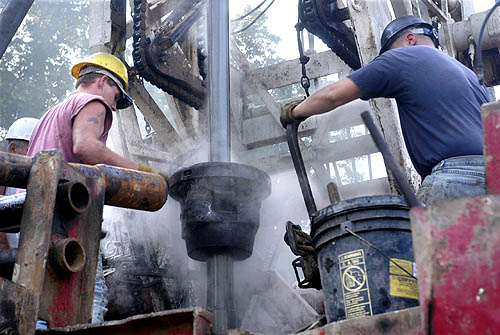
Pittsburgh Post-Gazette
28 November 2008
By Don Hopey

VWH Campbell/Post-Gazette - In a letter to the state Department of Environmental Protection, 13 groups said that if the deep well drilling boom continues without adequate regulation, permitting and enforcement it could "irreparably and unnecessarily harm habitat and water resources. ... in some of the most pristine parts of the state."
Thirteen environmental and sportsmen's organizations have asked the state to do a better job regulating water use and disposal by deep natural gas well drillers that are rushing to tap into the potentially lucrative Marcellus Shales geologic formation.
In a Tuesday letter to the state Department of Environmental Protection, the groups said that if the deep well drilling boom continues without adequate regulation, permitting and enforcement it could "irreparably and unnecessarily harm habitat and water resources. ... in some of the most pristine parts of the state."
Gas well drilling is expanding dramatically in Pennsylvania, driven by higher gas prices and new horizontal well drilling technology that makes it possible to tap the 5,000- to 8,000-foot-deep Marcellus Shales.
The 200- to 400-foot-thick geological formation of black rock under much of Pennsylvania, and parts of New York, West Virginia and Ohio, could contain up to 516 trillion cubic feet of natural gas and be the biggest gas "play" in the nation.
But the deep horizontal drilling rigs now operating in the state require large amounts of water -- up to 4 million gallons per well -- to fracture or "frac" the shale and release the gas. More than 550 wells have already been permitted by the DEP and natural gas companies are leasing mineral rights across the state so they can drill many hundreds more.
Myron Arnowitt, Clean Water Action state director, said the letter follows up on a meeting several of the groups had with DEP Acting Secretary John Hanger Monday in Harrisburg where the groups told him that well drillers shouldn't be allowed to drain streams and discharges must be treated and not just diluted.
The groups were reacting to reports that drillers had, according to the DEP, "pumped dry" Sugarcamp Run and depleted the flow in Cross Creek "down to the rocks on the bed of the stream." Both streams are in Washington County.
And although the gas industry denies it, the DEP has said that discharges of thousand of gallons of untreated well drilling water has significantly contributed to the high Total Dissolved Solids readings in the Monongahela River. Those elevated TDS levels have worried some industrial water users and caused some public water supply customers concern about taste, smell and glassware spotting.
The brine water from the well drilling operations contains lots of salt -- up to a pound per gallon -- plus arsenic, a known carcinogen, and other heavy metals. The sewage plants, which have been allowed to dilute and discharge the drill water, are not equipped to remove the dissolved solids.
"Drilling companies have to come up with a way to treat their wastes and not foist them off on sewage plants," Mr. Arnowitt said.
The groups are also urging the DEP to place pristine and environmentally sensitive areas of the state off limits to drilling and pipelines, better regulate water runoff and erosion around drill sites and publicly identify chemicals well drillers are adding to the "frac" water and pumping underground.
"We think Hanger understands our concerns and the DEP is looking for ways to make this work," Mr. Arnowitt said. "But there are already problems, and going forward we're concerned that economic considerations will override the environmental."
The gas well drilling industry groups and companies, especially those familiar with lighter regulations in other states, have recently been lobbying state legislators and the governor to speed well drilling permits and refrain from imposing regulations that delay development of the Marcellus Shales gas field or "play."
In addition to Clean Water Action, this week's letter was signed by representatives of the Pennsylvania Campaign for Clean Water, Center for Coalfield Justice, Chesapeake Bay Foundation, Citizens for Pennsylvania's Future, Damascus Citizens for Sustainability, Delaware Riverkeeper Network, Mountain Watershed association, PennEnvironment, Sierra Club Pennsylvania Chapter, Pennsylvania Trout Unlimited and the University of Pittsburgh's Center for Healthy Environments and Communities.
Teresa Candori, a DEP spokeswoman, said many of the groups' concerns have already been addressed in a Water Use Management Plan adopted by DEP in August. A permit condition added in mid-September requires drillers to file monthly reports on how much water they've withdrawn and from where.
But as of mid-November no water withdrawal plans had been filed with the DEP. Tom Rathbun, a DEP spokesman, said the lack of reports reflects a slowdown in drilling caused by poor economic conditions and recent declines in natural gas prices. It also may indicate that drillers are getting their water from public water suppliers instead of streams.
Both the environmental groups and the DEP agree that the department needs to hire additional staff to handle the expanding number of gas well permits, review and enforcement. That will be difficult given the state budget cuts and hiring freeze. Ms. Candori said the DEP is working on a request for new hires.
Don Hopey can be reached at dhopey@post-gazette.com or 412-263-1983.